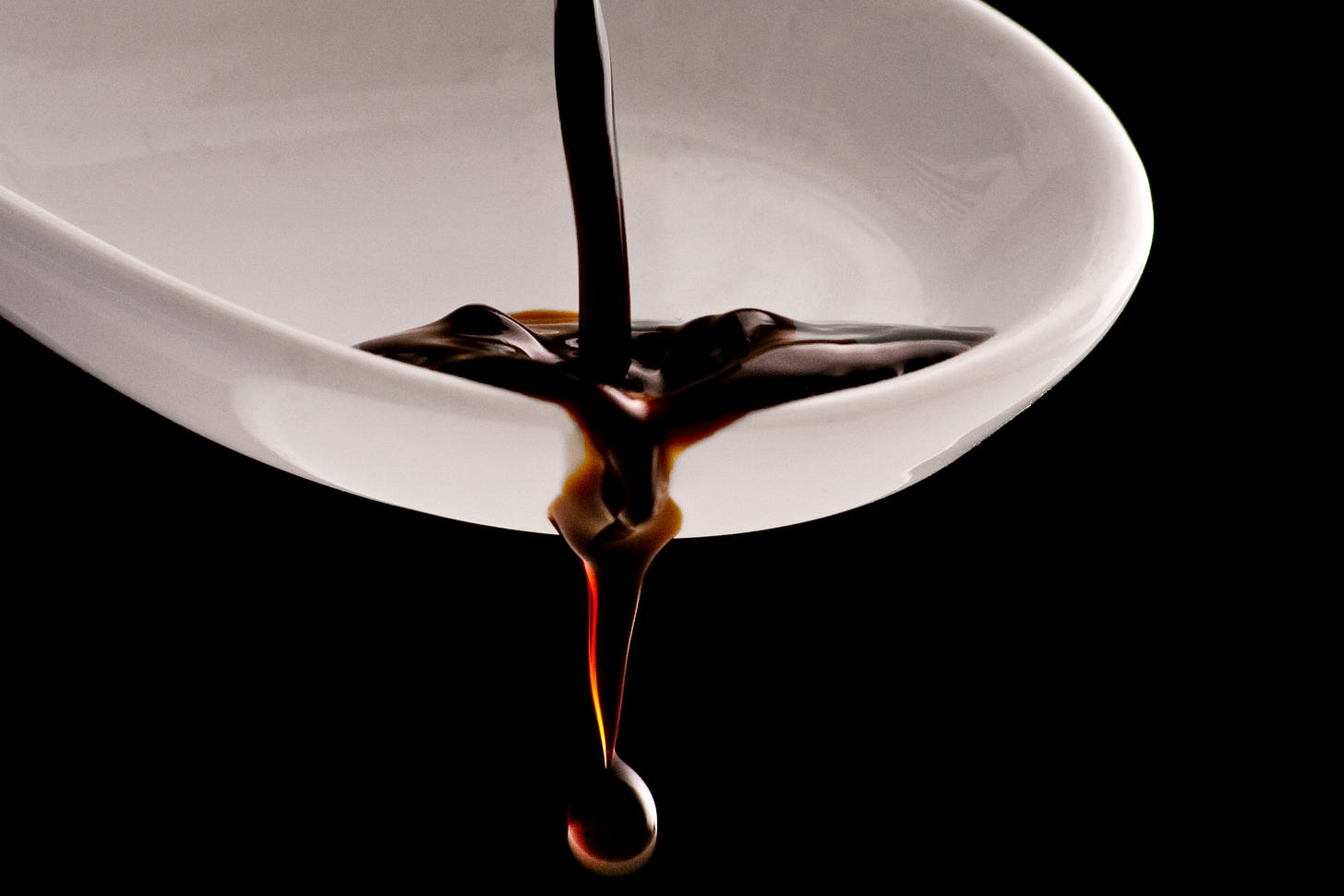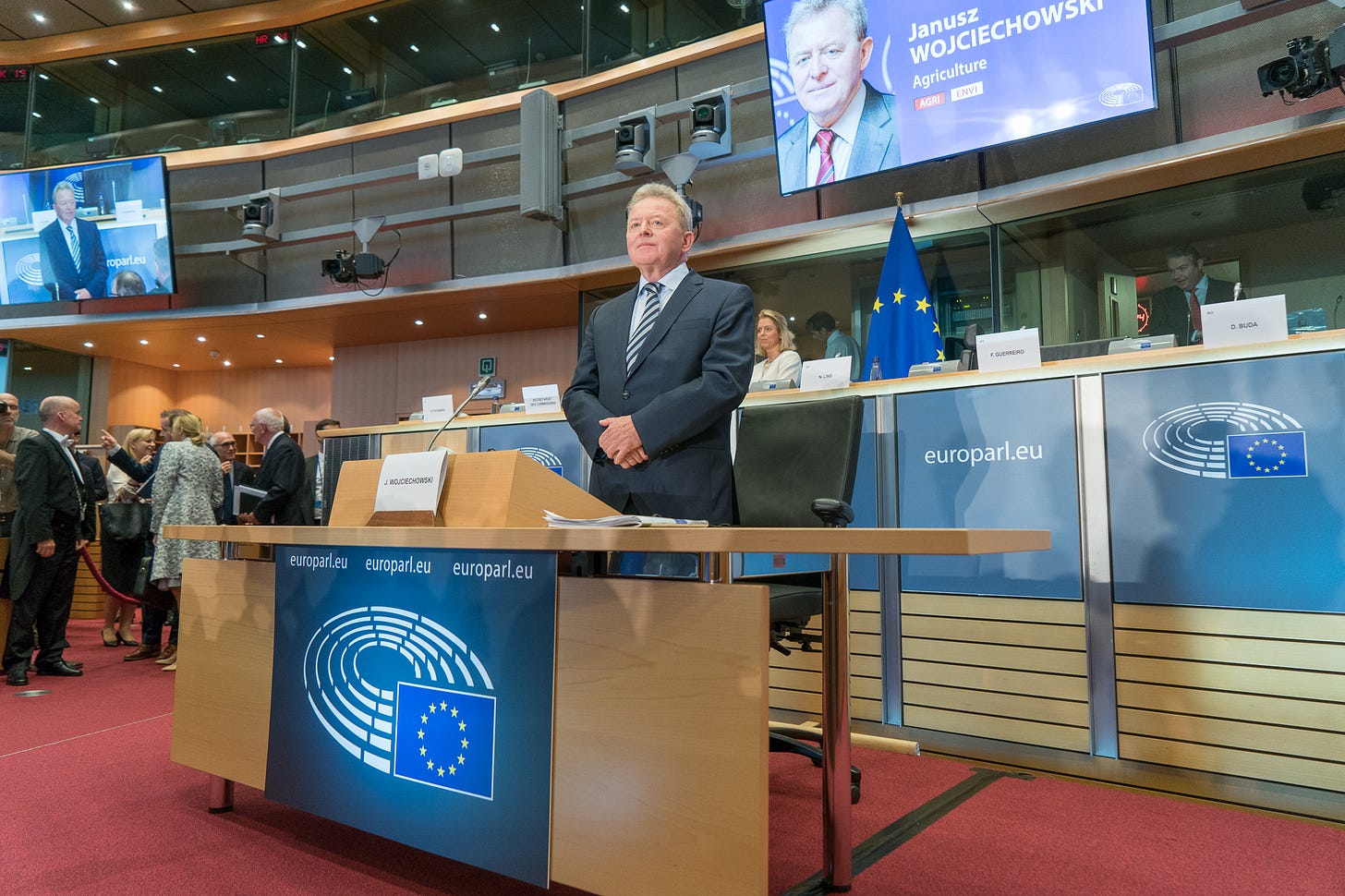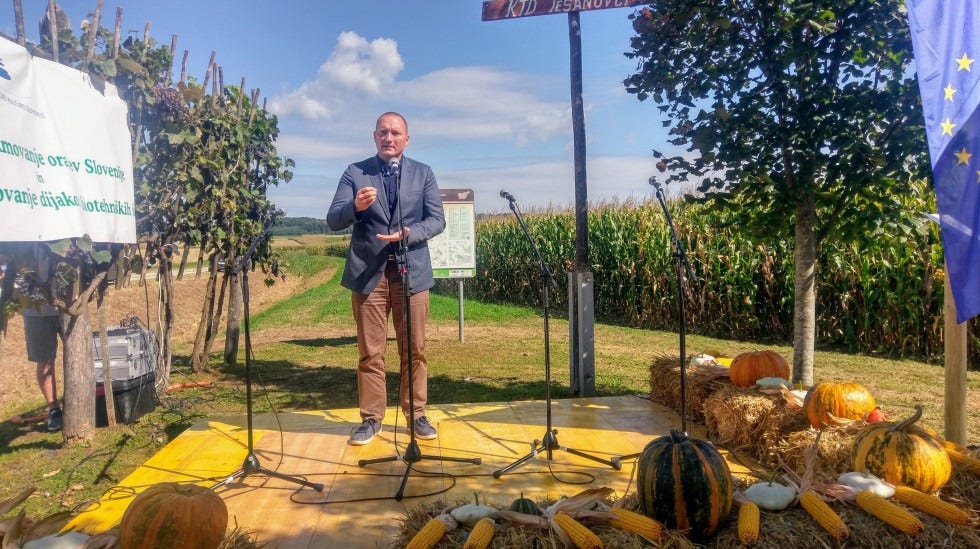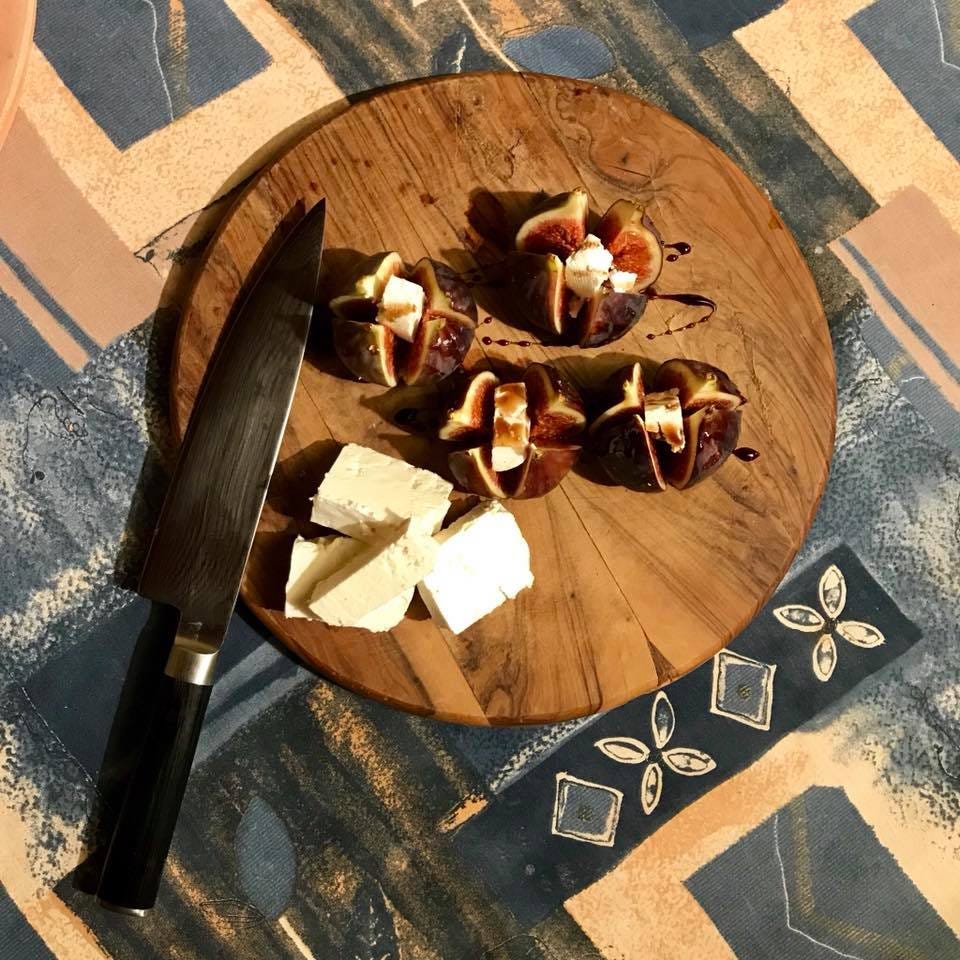XXXVIII. The Balsamico challenge
Italy is up in arms to defend the world-famous Modena product against the new Slovenian draft rule on the quality of vinegar. The EU Commission will take a decision by June 3
Hi,
welcome back to BarBalkans, the Italian newsletter whose aim is to give a voice to the Western Balkans’ stories, on the 30th anniversary of the Yugoslav Wars.
Today, we will not move an inch from our bar, the BarBalkans.
We are about to venture into a diplomatic dispute between Italy and Slovenia over food.
Or rather, over one of the most precious dressing used in cooking: the balsamic vinegar.
The Balsamico of discord
For a few weeks, a controversy has been raging in Europe over who has the right to produce and sell balsamic vinegar.
It all started on February 23, when a notification sent by the Slovenian government to the European Commission in early December was made public.
This national draft rule on the quality of vinegar and diluted acetic acid ensures that any hashing of wine vinegar can be sold as balsamic vinegar.
The new rule would make a standard for the production of balsamic vinegar and it could come into open conflict with the EU quality schemes that regulate the labelling system.
Where does the controversy begin?
The Traditional Balsamic Vinegar of Modena has been protected under the European Protected Designation of Origin (PDO) since 2000.
Nine years later, the European Union attributed the Balsamic Vinegar of Modena the Protected Geographical Indication (PGI) against counterfeiting.
However, we have to consider one detail.
A 2019 ruling from the European Court of Justice (ECJ) stated that such protection is not extended to its non-geographical components: “aceto” and “balsamico”.
It means that in Slovenia (and everywhere in Europe) you cannot incur in penalties as long as you do not label a product “Balsamic Vinegar of Modena”.
“Balsamic vinegar of Modena”, no.
”Balsamic vinegar”, yes.
At the very beginning, the EU Commission took time until March 3 to decide on the dispute.
But in the end it was decided to study the Slovenian draft rules and give an answer to the Italian government in three more months (until June 3).
It will be a headache for the European Commissioner for Agriculture, Janusz Wojciechowski.
While the ruling of the EU Court did not extend the protection to the non-geographical components, at the same time it did not consider the notion of evocation.
This means that it is not enough to avoid the explicit definition of “Balsamic Vinegar of Modena”. It is not as well permitted to evocate the product in a subtle way, through its most characteristic symbols.
According to the 2012 EU quality schemes for agricultural products and foodstuffs, PDOs and PGIs are protected not only from misuse and imitation, but also from the evocation of the place where they are made.
The EU Commission extends the notion of evocation to all the components of a product presentation (images, expressions, concepts) that can recall the registered name in the consumer’s mind.
But above all, a historic 2019 ruling from the EU Court of Justice stated the unlawful use of the literary character Don Quixote de La Mancha by a Spanish company for the promotion of a certain cheese, as the image evoked the geographical area where the PGI cheese is produced.
The dispute over the balsamic vinegar is a chaotic tangle, but the final decision will have heavy repercussions on Italian and Slovenian economies.
The EU Commission will come out with a decision by the beginning of June, but the diplomatic clash has just begun.
Italy up in arms
The Italian Minister of Agricultural, Food and Forestry Policies, Stefano Patuanelli, stated that «the protection of the Italian gastronomic heritage is a priority of the government» and for this reason «we will do everything to defend the Balsamic Vinegar of Modena».
The protection consortia have thundered against «a real offense to the tradition and the efforts made by the producers in Modena», the Director of the ‘Consortium of Balsamic Vinegar of Modena’, Federico Desimoni, accused.
Mariangela Grosoli, President of the ‘Consortium for the Protection of Balsamic Vinegar of Modena’, stressed that the situation «threatens to damage the whole system of PDOs and PGIs in Italy».
According to Coldiretti (the major organization representing agricultural entrepreneurs at national and European level), the Slovenian proposal would put 1 billion euros at risk. But it would also expand the global trade in fake Italian goods (worthing over 100 billion euros) through the misuse of Italian words, colors, locations, images and denominations.
In Brussels, several Italian MEPs in the European Parliament’s Committee on Agriculture - from different political groups - made sure that the Italian voice is heard by the EU Commission.
Paolo De Castro (S&D) submitted a parliamentary question to the Commissioner for Agriculture, Janusz Wojciechowski:
«The quality standard of the Slovenian vinegars is in clear contrast with the EU regulation 1151/2012 on quality schemes for agricultural products and foodstuffs and it would represent an unfair competition with the world-famous Italian products».
Elena Lizzi (ID) sent a letter to the Commissioner Wojciechowski, the Executive Vice President and Commissioner for Competition, Margrethe Vestager, and the Commissioner for the Internal Market, Thierry Breton:
«The Commission must intervene immediately to defend and protect one of the most symbolic products of the Made in Italy label. The Slovenian initiative represents an attack to the Italian territory, culture and tradition and it risks becoming a dangerous precedent, because other Member States could threaten further Italian sectors».
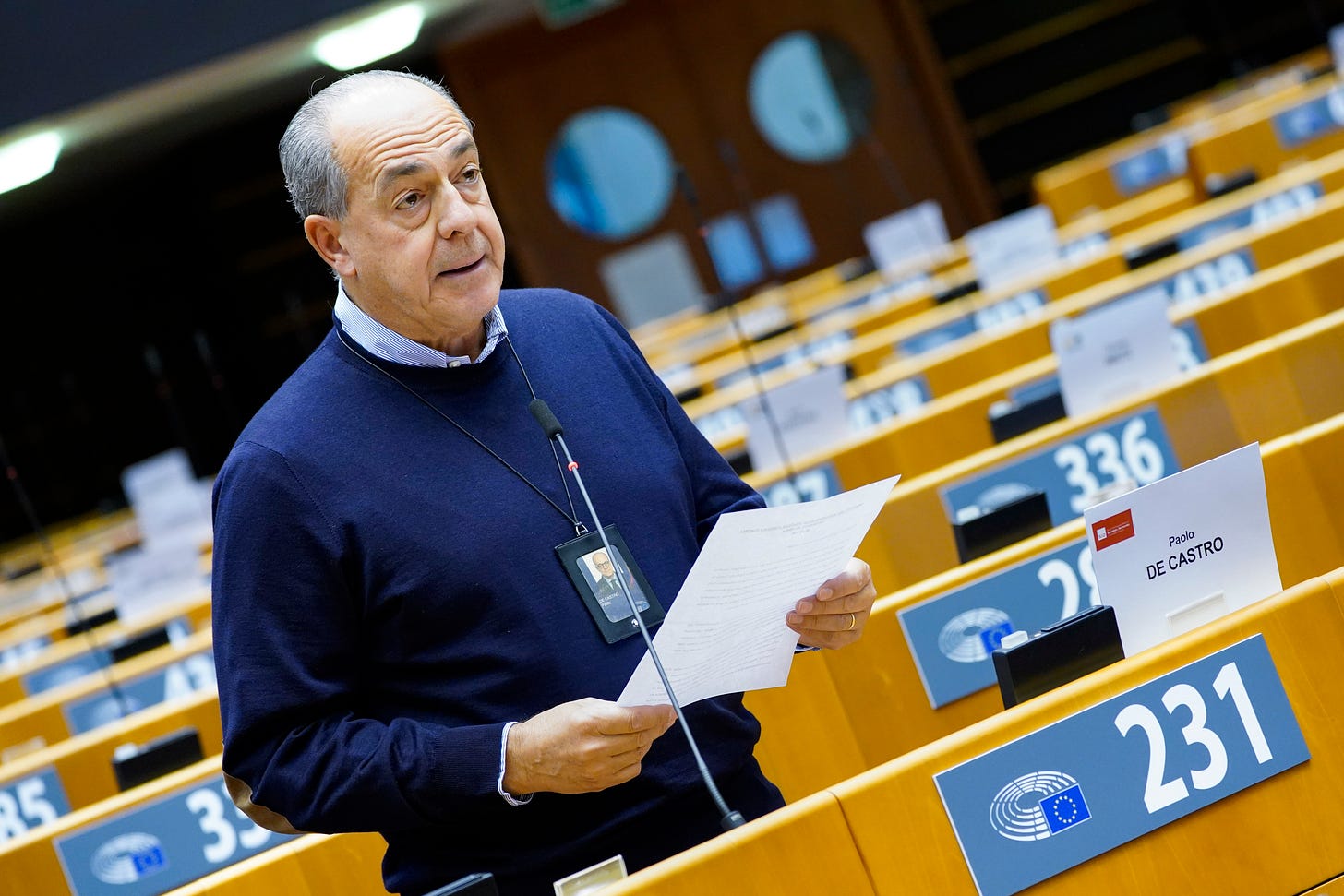
Astonishment in Slovenia
While the Italian reaction was - predictably - outraged, Slovenia showed a mixture of incredulity and astonishment.
Jože Podgoršek, Minister of Agricultural, Food and Forestry Policies, stated that he was surprised by the dispute, because he had not received any notification or official comment on the draft rule presented to the EU since the beginning of December.
The Minister also noted that «the new draft does not contradict or limit in any way the EU quality schemes for the Balsamic Vinegar of Modena».
The Slovenian position is based on the fact that the current rules on the quality of balsamic vinegar of January 2004 would remain «substantially unchanged».
Furthermore, «the traditional technologies in use in Slovenia are different from those used for the production of Balsamic Vinegar of Modena».
The content of the new draft, which would not change the use of the definition “balsamic vinegar”, will be studied and commented by the other EU Member States.
At the moment, Ljubljana has received no official comments.
The European diplomacy has to defuse a potential diplomatic conflict that risks having serious repercussions. Not only at the table.
Pit stop. Sittin’ at the BarBalkans
We have reached the end of this piece of road, almost entirely spent at our bar, the BarBalkans.
We say goodbye with something that will settle the argument.
Our trusted host prepares for us a dish with soft sheep milk cheese from North Macedonia and ripe figs from Bosnia and Herzegovina. With a drizzle of balsamic vinegar of Modena as a dressing.
Italy and the Balkans countries have far more in common with each other than things that divide them.
Let’s continue the BarBalkans journey. We’ll meet again in a week, for the 39th stop.
A big hug and have a good journey!
BarBalkans is a free weekly newsletter. Behind these contents there is a lot of work undertaken. If you want to help this project to improve, I kindly ask you to consider the possibility of donating. As a gift, every second Wednesday of the month you will receive a podcast with an article about the dissolution of Yugoslavia.
If you want a preview, just listen to the last episode of BarBalkans - Podcast: you can find it on Spreaker and Spotify!
As always, I thank you for getting this far with me. Here you can find all the previous newsletters.
If you want to help me to make this experience grow, you can invite whoever you want to subscribe to the newsletter:
Pay attention! The first time you will receive the newsletter, it may go to spam, or to “Promotions Tab”, if you use Gmail. Just move it to “Inbox” and, on the top of the e-mail, flag the specific option to receive the next ones there.
BarBalkans is on Facebook and Instagram, while on Linktree you can find the updated archive.




